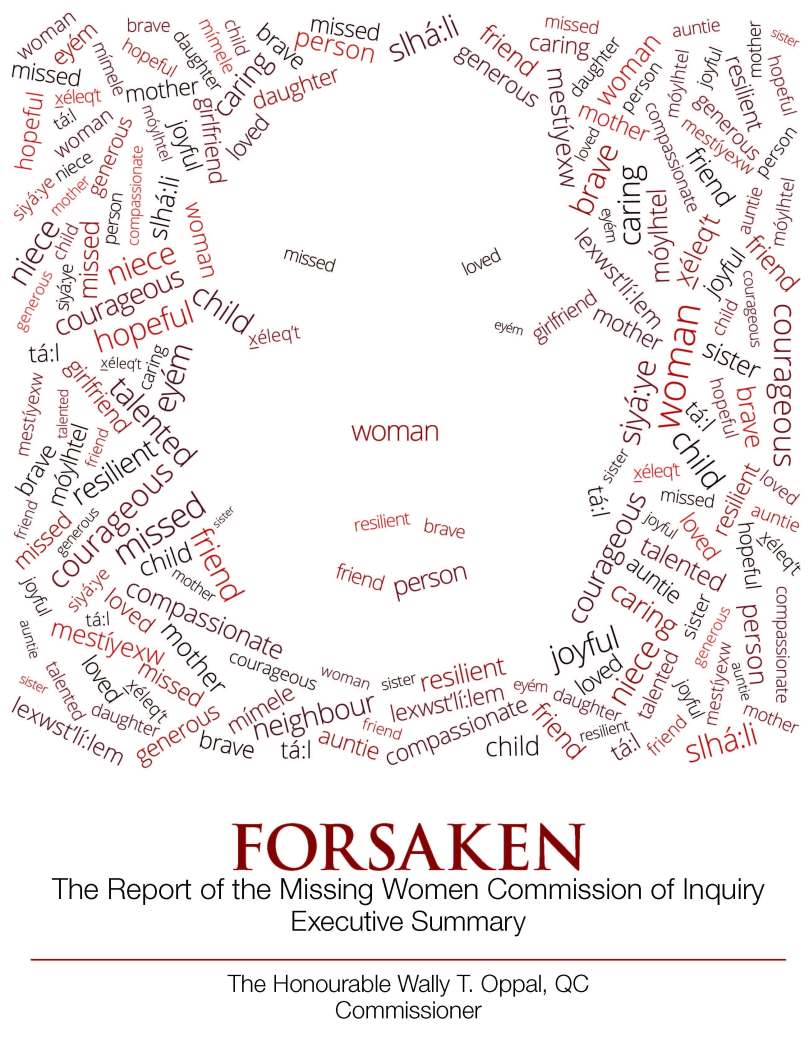
The Missing Women Commission of Inquiry was established in September 2010 to inquire into the “(BC Missing Women) Investigation and events leading up to the arrest and conviction of Robert W. Pickton and a broader examination of the manner in which cases involving missing women are investigated.”
The final report, including 63 recommendations, by Commissioner Wally Oppal was released in mid-December.
Oppal begins his report by looking at the context of the lives of the women. He states:
Each missing and murdered woman had a unique life and story. At the same time, this group of women shares the experience of one or more disadvantaging social and economic factors: violence, poverty, addiction, racism, mental health issues, intergenerational impact of residential schools and so on. While not every woman experienced each of these conditions, most had experienced several of them. (p. 12)
While the story of the missing and murdered women might seem unrelated to FASD prevention, health and social service providers who work with women who have experienced (and continue to experience) these interlinking factors – violence, poverty, addiction, racism, mental health issues, intergenerational impact of residential schools – would argue differently. Many women who are at risk for having an alcohol-exposed pregnancy are facing one or more of these issues.
For example, Susan Astley and her colleagues conducted a seminal piece of research in Washington State, in which they followed up with 160 women who had children diagnosed with fetal alcohol syndrome. Forty of the women could not be contacted due to confidentiality issues, another 40 had died or disappeared; of the 80 women they interviewed, they found:
- 100% had been seriously sexually, physically, or emotionally abused;
- 80% had a major mental illness, with the most prevalent (77%) being Post-Traumatic Stress Disorder (PTSD);
- 80% still lived with men who did not want them to stop drinking; and
- 46% were still at risk of having an alcohol-exposed pregnancy.
As another example – some of you may be familiar with the InSight Mentoring Program in Manitoba, an outreach program that provides intensive support to women who are pregnant or have recently had a baby and have substance use problems. Of the first 60 women to enroll in the program, 100% reported experiencing abuse or violence at some point in their lives (Umlah & Grant, 2003).
These research findings illustrate the importance of recognizing and understanding the role violence and other related factors plays in the lives of pregnant women struggling with their use of drugs or alcohol. Reports like the one from the Missing Women Commission of Inquiry serve as a reminder that these issues are not isolated events or confined to pregnancy and require broader systemic changes.
You can download the full report from http://www.missingwomeninquiry.ca. For recent media coverage, see:
- ‘Colossal Failure’ By Police on Missing Women: Oppal (TheTyee.ca, December 18, 2012)
- Missing Women report to be released amid heavy criticism (CTV News, December 16, 2012)
- B.C. Highway of Tears: RCMP accused of not taking women’s disappearances seriously (The Star, December 28, 2012)
References:
Astley SJ, Bailey D, Talbot T, Clarren SK (2000). Fetal alcohol syndrome (FAS) primary prevention through FAS Diangosis: II. A comprehensive profile of 80 birth mothers of children with FAS. Alcohol & Alcoholism, (35) 5:509-519.
Oppal, Wally T. (2012). Forsaken: the Report of the Missing Women Commission of Inquiry: Executive Summary. Available from: http://www.missingwomeninquiry.ca/
Umlah, C. & T. Grant (2003). Intervening to prevent prenatal alcohol and drug exposure: the Manitoba experience in replicating a paraprofessional model. Envision: The Manitoba Journal of Child Welfare, 2(1): 1-12.
